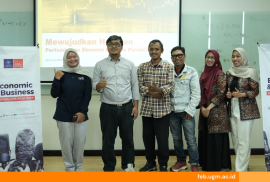Indonesian economy in the 3rd quarter of 2015 grew 4.73% compared to the figure of the same quarter in the previous year, and grew 3.21% against the previous quarter. However, economic growth is not accompanied by improvements in other indicators, so there are still cases such as unequal distribution of income, poverty, and unemployment.
The Gini coefficient that is used to measure the inequality of income distribution reached 0.41% in March 2015, while the number of poor in the same month reached 28.59 million people (11,22%) with the high proportion of poor people in rural areas. Meanwhile, the number of unemployed in August 2015 was 7.56 million people.
The indicators show that Indonesia as a country, which is rich in natural resources and human resources, still faces very serious problems in rural development, particularly related to the problem of slow pace of reduction of poverty and unemployment. To reduce income inequality between rural and city dwellers, villagers should be the center of attention in development.
This issue is the background to the Moral Revolutionary event themed One Village One Cooperative, initiated by Dashboard Ekonomika Kerakyatan (DEK) Faculty of Economics and Business, Universitas Gadjah Mada (UGM). “This Moral Revolution movement is consistent and supportive programs to the government’s Mental Revolution that aims to change the mindset of the nation with the spirit of integrity, hard work, and solidarity,” said the chairman of DEK, Prof. Gunawan Sumodiningrat, M.Ec., Ph.D., in the launch of this movement, Saturday (30/1,) at the University Club UGM.
One Village One Cooperative Program (SDSK) is an integrated rural development program and community-based where villagers are driven independently and be driving for the welfare of the village. “We need to improve human capital, and be optimistic that the future will be better so we have a passion to work,” added by Deputy Minister of Human Development and Culture for Coordination of Education and Religious Affairs, Prof. Dr. R. Agus Sartono, MBA.
Through this program, rural communities are given guidance to conduct productive business by utilizing the potential that exists in the village in a sustainable manner. In addition, there is a need to revive the cooperative as a financial institution owned by the community to be professionally managed. To achieve this goal, we need the cooperation of all parties to foster the education of rural communities through capacity building as well as a series of mentoring and evaluation process. It requires the synergy between academia, business, government, community, financial institutions, and the media in realizing the vision of the movement.
The movement will start from Gedangsari village, Gunung Kidul, in the hope that other regions can also adopt this concept, so that later each village has at least one financial cooperative or credit unions.
Sumber: ugm.ac.id




